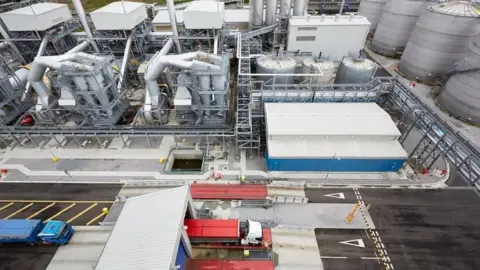Biofuel plant could close with loss of 150 jobs
 Vivergo
VivergoThe company behind Primark has announced it could close a bioethanol plant in East Yorkshire, putting about 150 jobs at risk.
Associated British Foods (ABF), a multinational food, ingredients and retail group, said it was in talks with the government to help preserve its Vivergo fuels site at Saltend, near Hull.
The plant has recorded a loss in recent months after cutting production levels due to low bioethanol prices.
ABF said the site could be closed or mothballed until conditions in the sector improved.
The plant produces bioethanol, which is used in a type of petrol called E10.
The fuel, which was introduced in 2021 to help cut carbon emissions, contains up to 10% bioethanol.
Vivergo also produces animal feed, which is a by-product of the bioethanol production process.
ABF told investors that the way in which regulations were being applied to bioethanol was undermining the commercial viability of the business.
The consumer giant said it was having "constructive discussions" with the government, but added there was no guarantee these would be successful.
"We will either mothball or close the Vivergo plant if necessary," a spokesperson added.
Government 'engaging'
George Weston, chief executive of ABF, said the government "subsidised" international competitors for their supply of bioethanol.
"If the government wants to subsidise imported bioethanol then we can't compete against that," he said.
However, he added that the government was "engaging with us on this".
The plant opened in 2012, but was mothballed between 2018 and 2021.
ABF's pre-tax profits slid by 21% to £692m for the 24 weeks to 1 March, with revenues 2% lower at £9.5bn for the period, shareholders were told.
In addition to Primark, the group owns brands including Kingsmill, Ryvita and Twinings.
Listen to highlights from Hull and East Yorkshire on BBC Sounds, watch the latest episode of Look North or tell us about a story you think we should be covering here.
